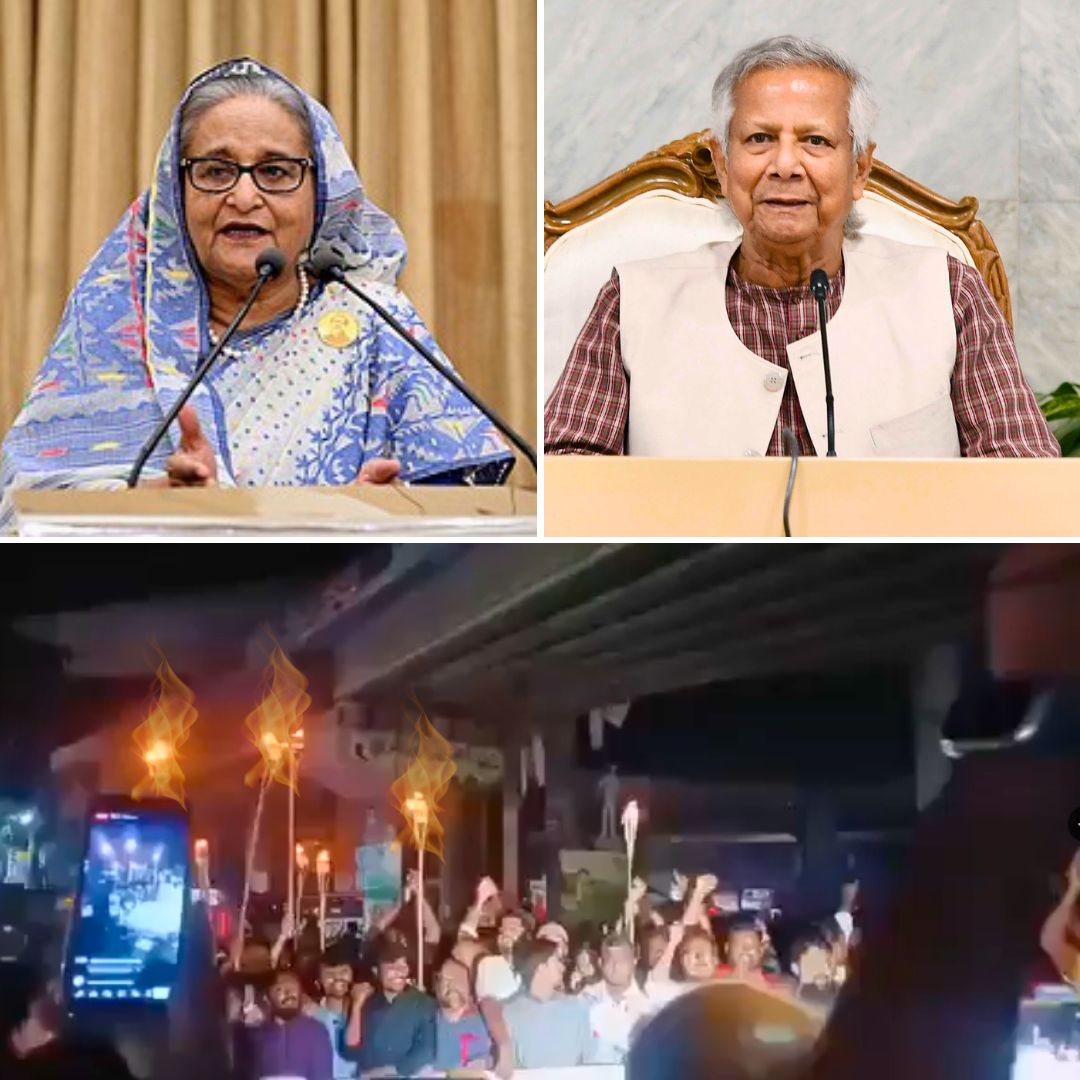Bangladesh is gripped by a sweeping nationwide shutdown and disruptive protests, called by Sheikh Hasina’s now-banned Awami League from November 14–17, demanding the resignation of interim Chief Adviser Muhammad Yunus.
Schools, transport, businesses, and daily life have ground to a halt, with pitched street protests and scattered violence, centring around Hasina’s impending trial for crimes against humanity over last year’s deadly crackdown.
All sides-Hasina’s Awami League, Yunus’s interim government, students, and civil society-claim to defend democracy, justice, and stability.
With thousands of security personnel deployed and uncertainty swirling ahead of the November 17 verdict, fears of further unrest are mounting as Bangladesh faces a historic test of its future governance.
Shutdown Halts Nation as Protests Escalate
Since November 14, Bangladesh has seen an unprecedented standstill, with road blockades, closed schools, deserted markets, and paralysed public life in Dhaka, Chittagong, Khulna, and other cities.
The protest-deemed a “lockdown” by organisers-was initiated by the Awami League, Bangladesh’s most prominent banned political party, and led by its exiled leader, former Prime Minister Sheikh Hasina.
Transport services have stopped, businesses are shuttered, and growing reports of violence, arson, and skirmishes between protesters and security forces have emerged. Several buses, government buildings, and a key Awami League office in Dhaka have been torched.
Authorities have deployed over 17,000 Dhaka Metropolitan Police officers, alongside Border Guard Bangladesh and paramilitary forces, to restore order and protect government institutions.
At least 50 Awami League supporters have been detained, accused of instigating violence.
The interim government blames the opposition for “terrorist acts and sabotage,” while the Awami League claims the regime orchestrated violence to malign the movement and warns it won’t relent until “democracy is restored.”
Sheikh Hasina in Exile: Leadership, Legacy, and Resolve
Sheikh Hasina, now living in India, remains the focal point of Bangladesh’s political storm. Facing charges of crimes against humanity regarding a deadly clampdown on student and civil uprising in July-August 2024, Hasina denies all wrongdoing, stating, “I mourn each and every life lost… but the implication that I ordered the violent crackdown is fundamentally incorrect”.
She says any decisions made during her tenure “were taken in the sole intention of minimising further chaos and casualties.” In a statement from exile, Hasina expresses “immense gratitude” to the Indian government for her refuge, and thanks supporters: “This movement is for the future of Bangladesh-students, workers, teachers, the common people.”
She has also welcomed the possibility of her party contesting elections if fair opportunities arise.
However, Hasina states the interim government, headed by Nobel laureate Muhammad Yunus, is “endangering bilateral ties with India and empowering extremist forces.” The Awami League continues to reject the authority of the tribunal judging Hasina, arguing the trial is a “political vendetta.”
Interim Government Response: Stability, Justice, and Security
Muhammad Yunus’s caretaker government, installed after the Awami League’s exile and ban in August 2024, insists the protests are orchestrated “to destabilise the country and subvert justice” as Hasina’s verdict looms. Yunus and senior officials stress that upholding the law is “non-negotiable,” and the International Crimes Tribunal will proceed with due process, asserting,
“The scheduled task of the tribunal will go ahead-no one is above the law.” The interim government faces pressure not only from the Awami League, but also from student protest movements over job cancellations and the wider public’s discontent with political instability.
Internationally, the crisis is watched closely: with New Delhi voicing concern about regional destabilisation, Bangladeshi authorities have even summoned India’s Deputy High Commissioner in Dhaka to object to Hasina’s media outreach from exile, fearing it may fuel unrest at home.
Other political organisations, such as the Islami Chhatra Shibir, accuse both major parties of prioritising power over reform and warn against “creating an unstable situation in the country”.
Backdrop: From Uprising to Tribunal
This escalation is rooted in the cataclysmic protests and mass killings of July–August 2024. The Hasina government’s crackdown on primarily student-led demonstrations, sparked by allegations of vote-rigging, corruption, and undemocratic governance, left hundreds dead and thousands injured.
The fallout saw Hasina’s 15-year rule end, the Awami League banned, and Muhammad Yunus-a non-partisan civil society leader and Nobel Peace Prize winner-chosen as interim chief.
Reformists have pressed the new government to permanently ban the Awami League and ensure accountability for past abuses through legal amendments and a public tribunal.
Critics, however, demand fair process, protection of rights, and open elections-warning that exclusion, vengeance, and political banning could further destabilise the country.
The Logical Indian’s Perspective
Bangladesh stands at a crossroads that will shape its democracy, justice, and the social compact for a generation. This crisis makes clear the urgency of moving away from cycles of retribution and retaliation, and towards dialogue, healing, and truth-telling.
Peaceful protest, empathy for victims, and robust debate are essential-yet so too are legal safeguards and the acceptance that no side owns the entire truth.
Civil society, youth movements, and everyday citizens hold immense potential to break the deadlock through creative solutions, solidarity, and calls for a common future.
The Logical Indian calls upon all stakeholders to reject violence, embrace genuine inclusivity, and build a consensus towards credible, participatory elections grounded in constitutional values and human rights.











